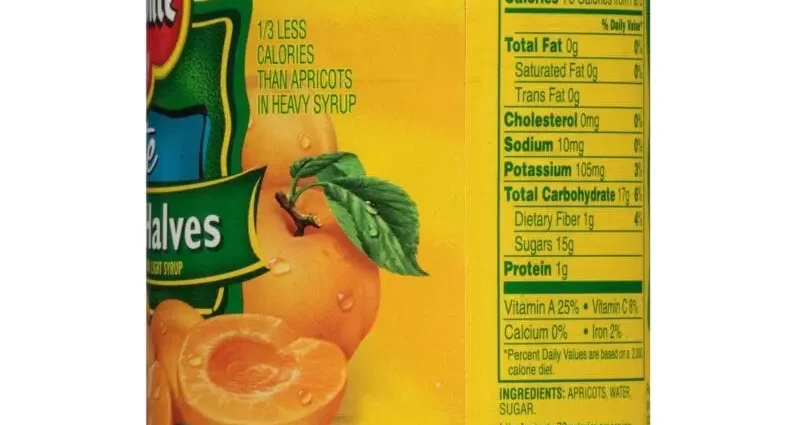Nutritional value and chemical composition.
The table shows the content of nutrients (calories, proteins, fats, carbohydrates, vitamins and minerals) per 100 grams edible part.
| Nutrient | Quantity | Norm** | % of the norm in 100 g | % of the norm in 100 kcal | 100% normal |
| Calorie value | 83 kCal | 1684 kCal | 4.9% | 5.9% | 2029 g |
| Proteins | 0.64 g | 76 g | 0.8% | 1% | 11875 g |
| Fats | 0.11 g | 56 g | 0.2% | 0.2% | 50909 g |
| Carbohydrates | 18.61 g | 219 g | 8.5% | 10.2% | 1177 g |
| Alimentary fiber | 2.7 g | 20 g | 13.5% | 16.3% | 741 g |
| Water | 77.56 g | 2273 g | 3.4% | 4.1% | 2931 g |
| Ash | 0.38 g | ~ | |||
| Vitamins | |||||
| Vitamin A, RE | 146 μg | 900 μg | 16.2% | 19.5% | 616 g |
| beta Carotene | 1.746 mg | 5 mg | 34.9% | 42% | 286 g |
| beta Cryptoxanthin | 16 μg | ~ | |||
| Lutein + Zeaxanthin | 39 μg | ~ | |||
| Vitamin B1, thiamine | 0.021 mg | 1.5 mg | 1.4% | 1.7% | 7143 g |
| Vitamin B2, riboflavin | 0.024 mg | 1.8 mg | 1.3% | 1.6% | 7500 g |
| Vitamin B4, choline | 2.8 mg | 500 mg | 0.6% | 0.7% | 17857 g |
| Vitamin B6, pyridoxine | 0.055 mg | 2 mg | 2.8% | 3.4% | 3636 g |
| Vitamin B9, folate | 2 μg | 400 μg | 0.5% | 0.6% | 20000 g |
| Vitamin C, ascorbic | 3.1 mg | 90 mg | 3.4% | 4.1% | 2903 g |
| Vitamin E, alpha tocopherol, TE | 0.89 mg | 15 mg | 5.9% | 7.1% | 1685 g |
| Vitamin K, phylloquinone | 3.3 μg | 120 μg | 2.8% | 3.4% | 3636 g |
| Vitamin PP, NE | 0.376 mg | 20 mg | 1.9% | 2.3% | 5319 g |
| Macronutrients | |||||
| Potassium, K | 143 mg | 2500 mg | 5.7% | 6.9% | 1748 g |
| Calcium, Ca | 10 mg | 1000 mg | 1% | 1.2% | 10000 g |
| Magnesium, Mg | 7 mg | 400 mg | 1.8% | 2.2% | 5714 g |
| Sodium, Na | 4 mg | 1300 mg | 0.3% | 0.4% | 32500 g |
| Sulfur, S | 6.4 mg | 1000 mg | 0.6% | 0.7% | 15625 g |
| Phosphorus, P | 13 mg | 800 mg | 1.6% | 1.9% | 6154 g |
| Trace Elements | |||||
| Iron, Fe | 0.3 mg | 18 mg | 1.7% | 2% | 6000 g |
| Copper, Cu | 97 μg | 1000 μg | 9.7% | 11.7% | 1031 g |
| Selenium, Se | 0.1 μg | 55 μg | 0.2% | 0.2% | 55000 g |
| Zinc, Zn | 0.11 mg | 12 mg | 0.9% | 1.1% | 10909 g |
| Digestible carbohydrates | |||||
| Mono- and disaccharides (sugars) | 18.65 g | max 100 г | |||
| Saturated fatty acids | |||||
| Saturated fatty acids | 0.007 g | max 18.7 г | |||
| 16: 0 Palmitic | 0.007 g | ~ | |||
| 18: 0 Stearin | 0.001 g | ~ | |||
| Monounsaturated fatty acids | 0.045 g | min 16.8 г | 0.3% | 0.4% | |
| 18: 1 Olein (omega-9) | 0.045 g | ~ | |||
| Polyunsaturated fatty acids | 0.021 g | from 11.2 to 20.6 | 0.2% | 0.2% | |
| 18: 2 Linoleic | 0.021 g | ~ | |||
| Omega-6 fatty acids | 0.021 g | from 4.7 to 16.8 | 0.4% | 0.5% |
The energy value is 83 kcal.
- cup, halves = 219 g (181.8 kCal)
- cup, whole = 182 g (151.1 kCal)
Canned apricots in saturated sugar syrup rich in vitamins and minerals such as: vitamin A – 16,2%, beta-carotene – 34,9%
- Vitamin A is responsible for normal development, reproductive function, skin and eye health, and maintaining immunity.
- B-carotene is provitamin A and has antioxidant properties. 6 mcg of beta-carotene is equivalent to 1 mcg of vitamin A.
Tags: calorie content 83 kcal, chemical composition, nutritional value, vitamins, minerals, what are the benefits of Apricots canned in saturated sugar syrup, calories, nutrients, useful properties Apricots canned in saturated sugar syrup










